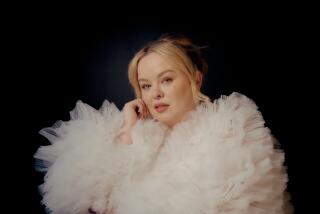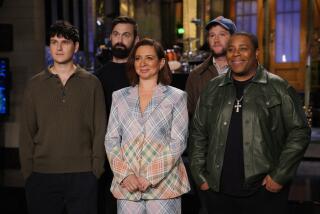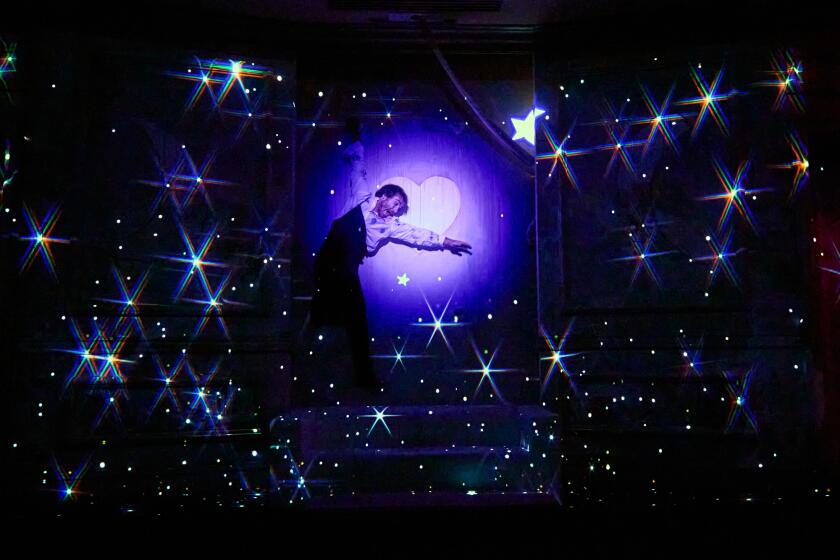Tucson Arts Festival Hopes to Find Its Place in the Sun
A potentially major arts festival debuts in Tucson next Sunday. Developed and supported by the University of Arizona, the first Festival in the Sun hopes to draw more than 150,000 people to varied events in more than 50 locations around the city.
Because the $1.2-million budget is being covered by local funds from the university, corporate donations and foundation grants, as well as ticket sales, this will be an affordable festival for the public. Top ticket price is $37 for a Jessye Norman recital and there are many free events. Most of the major events are at the university’s Centennial Hall, which had an award-winning, $4-million renovation completed in 1987, but other festival venues range from the historic San Xavier del Bac Mission to the Cactus Club of the Westin La Paloma.
According to Alexandra Jupin, executive director of the festival and the UA Office of Cultural Affairs, “The festival has been in the mind of (UA) President Henry Koffler for a long time.” Jupin said the festival’s goals--”not in any order of priority”--are:
* Bring a broad array of internationally acclaimed artists to Tucson, for performances centered around the theme “Turning Points.” The roster includes the St. Paul Chamber Orchestra, Folklorico Durango, Isaac Stern, Pilobolus Dance Theatre, the Billy Taylor Trio, Jessye Norman and the David Parsons Dance Company.
* Commission new works relevant to the theme. This year’s commissions are “Apache Wine” from composer Daniel Lentz and “The Kiss” from choreographer David Parsons.
* Do something at a time of the year that would be unique on the festival calendar, capitalizing on the winter ambience of Tucson.
* Pay homage to the Tucson arts community and heritage. The festival emphasizes the rich folkloric tradition of Spanish-American and Native American arts, and features the local resident companies such as Ballet Arizona, the Arizona Theatre Company, Invisible Theatre and the Tucson Symphony.
* Include an educational thread. More than 65 educational and outreach events, for school kids, UA students and the general public, are part of the festival, and involve the guest artists as well as the locals.
The theme for the festival was actually formulated by Hugh Wolff, conductor of the St. Paul Chamber Orchestra, in discussions with Jupin back in 1988. “ ‘Turning Points’ is a flexible theme, that can be approached in many ways,” Jupin says. “It involves looking at works of art that marked turning points--contemporary or historical--in their fields.”
This flexible theme will serve the festival every year. Jupin is already thinking about 1992, and plans for 1991 are already under way. That second festival is scheduled for Feb. 17-March 10, 1991, and will feature commissions for the Kronos Quartet and Miami City Ballet, if Jupin’s plans pan out. The Mozart bicentennial will be celebrated with appearances by the Mozarteum Salzburg.
The festival, which runs through March 4, begins with an all-day Cavalcade of Arts, “an egalitarian, inclusive celebration with literally hundreds of artists on three stages, ending with a laser show,” according to Jupin. “Apache Wine” premieres Feb. 16, on a St. Paul Chamber Orchestra concert launching a six-day residency by the ensemble and conductor Hugh Wolff. “The Kiss” bows March 2, beginning a three-day engagement by the David Parsons Dance Company.
For a complete festival schedule, call (602) 621-5789.
MORE FESTS: In its 14th incarnation, the CalArts Contemporary Music Festival has become Contemporary Music of the Pacific Rim, the first component in the CalArts 1990 Spring Music Festival, celebrating the 20th anniversary of the institute. It opens March 2 in the campus Main Gallery with the Tokyo International Music Ensemble, and continues March 3 and 4 with in-house ensembles. Other components of the large umbrella fest are Jazz for the 21st Century, March 31, and World Music of Java, Bali, Ghana, North India and More, April 20-22 and 27-29.
Information: (805) 253-7832.
The Chamber Music/L.A. Festival this year is built around an “East Meets West” theme. Performers include flutist Michiko Akao, harpist Ayako Shinozaki, pianist Shunsuke Kurakata, koto player Kazue Sawai, percussionist Eitetsu Hayashi, cellist Sumiko Kurata and calligrapher Shioh Kato, who will create an 8-by-24-foot canvass during the performance of Isao Matsushita’s “Ko-kyo,” on the opening concert May 13. The other concerts are all at the Japan America Theatre, May 17, 20, 24, 27.
Information: (213) 850-8064.
SILENCE: There was no music during the scheduled Jan. 6 performance of the La Mirada Symphony because there was, well, no music. After a 26-year, 125-concert history of no cancellations, the community orchestra was silenced by a La Mirada Civic Theatre custodian who accidentally threw away the two boxes--all the orchestral parts--for the scheduled program of Russian music. According to conductor Leon Guide, the Jan. 6 program has been rescheduled for May 23. Incidentally, there was no clamor for ticket refunds: La Mirada Symphony concerts are free.
BIG INSTRUMENT: A colossal concert organ, five years under construction at Chico State University, finally made its debut, recently, in Brahms/Bach concert. Still unfinished, the huge instrument, which measures 27 feet high and nine feet deep, is believed to be the first of its kind to be built on site since the Middle Ages. Now school officials are debating where to house the organ, which currently crowds the stage of the school’s Harlan Adams Theater. Moving the organ would require re-voicing and tuning each of its 2,300 pipes to match the acoustics of the new location.
BY THE BAY: The San Francisco Symphony has announced a two-day celebration of Isaac Stern’s 70th birthday, the weekend of July 21-22 (Stern was born in Kremenetz, U.S.S.R. on July 21, 1920). The festivities will culminate in a free concert donated by the violinist--who grew up in San Francisco and had all his early training there--in Stern Grove (no relation) at Golden Gate Park. At that Sunday afternoon event, the celebrated musician will be joined by colleagues: David Zinman, Andree Previn, Alexander Schneider, Jaime Laredo, Cho-Liang Lin, Mark Peskanov, Gil Shaham, Sharon Robinson, Jian Wang, Yefim Bronfman and Jean-Pierre Rampal. . . . Patrick Summers has been appointed music director of the San Francisco Opera Center, the company’s umbrella organization of performances and training programs for young singers and coaches. Summers is the second music director of the center; the first was the late Andrew Meltzer, who held the post from the inception of the center in 1982 until his death in 1988. . . . Grammy-award winning singer Bobby McFerrin will make his debut as a conductor at a special concert of the San Francisco Symphony, March 11 in Louise M. Davies Hall.
Daniel Cariaga and David Sweet contributed to this column.
More to Read
The biggest entertainment stories
Get our big stories about Hollywood, film, television, music, arts, culture and more right in your inbox as soon as they publish.
You may occasionally receive promotional content from the Los Angeles Times.






